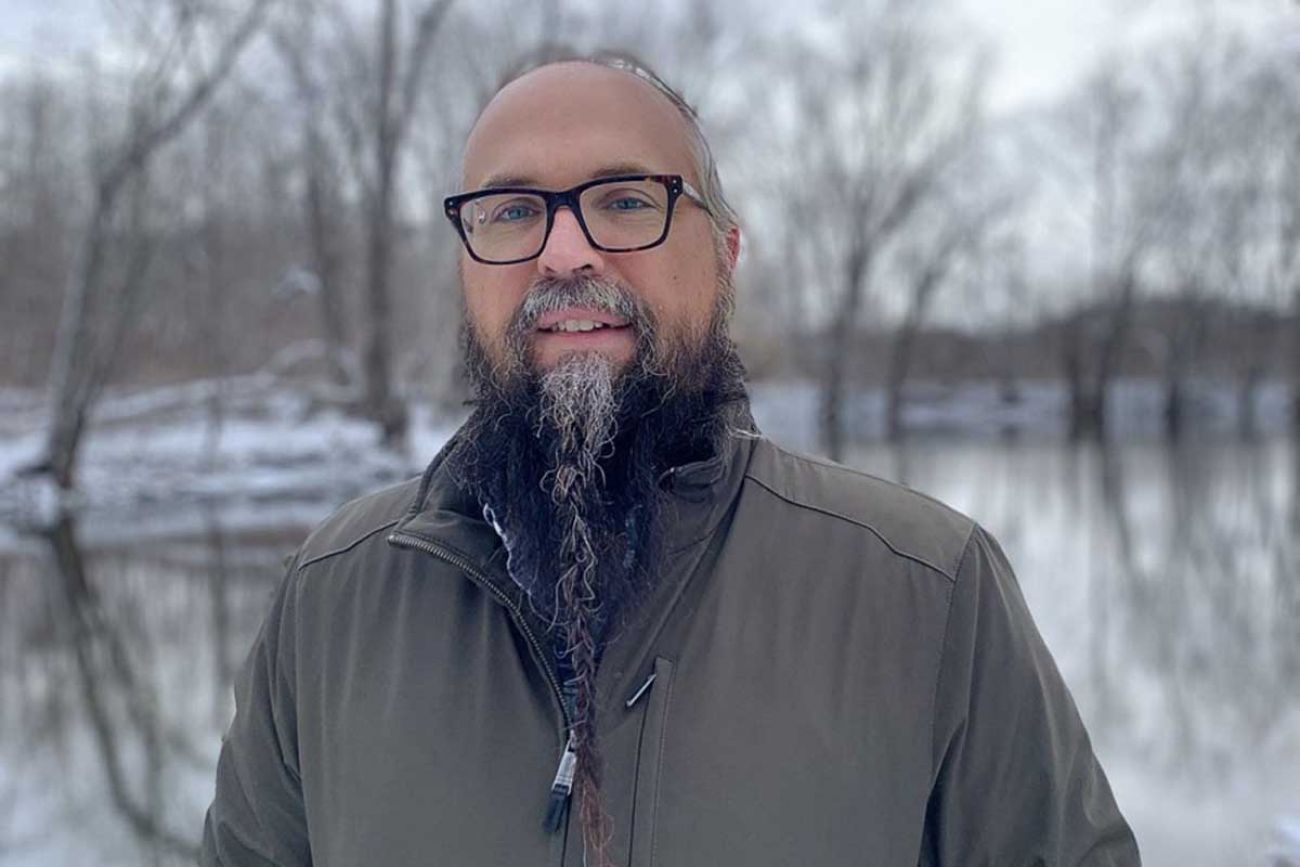Meet the Michigander who's advising Biden on environmental justice

Kyle Whyte has long advocated for Native American tribes and other marginalized communities to get a seat at the table with government decisionmakers.
Now, the University of Michigan professor, who is a member of the Citizen Potawatomi Nation, has a role in President Joe Biden’s administration.
Related:

Whyte, U-M’s George Willis Pack Professor of Environment and Sustainability, is one of 26 members of the new White House Environmental Justice Advisory Council, which will help shape the administration’s environmental justice strategy and endeavor to hold it to its promises.
Biden launched his presidency with a flurry of promises to help communities of color and poor communities that face more industrial pollution, climate change-related risks and other environmental burdens than white and affluent communities. He has vowed to create and expand federal offices dedicated to environmental justice, craft new policies and direct billions in funding toward the cause.
Bridge spoke with Whyte about his plans for the role. The conversation has been edited for clarity and brevity.
Let’s start with the basics: What does environmental justice mean to you?
It means that all people have access to clean, healthy and safe environments that allow them to practice their cultures and exercise their political sovereignty and self-determination.
Many communities of color and Indigenous people are living in situations where the environment is dirtier, there's a lack of access to green space, where we don't have good infrastructure and housing conditions, and we don't have access to healthy foods. These situations are not our fault. In many cases, certain communities were targeted as the host site for polluting technologies or other threats specifically because people of color and Indigenous people live there. Environmental justice is about working to stop these situations from persisting into the future.
For many people-of-color communities, that process starts with being able to participate in decisionmaking that affects them. For tribal people, there's a unique context there. We existed prior to the formation of the United States so we're politically independent, sovereign nations. But the U.S. government hasn’t always respected that sovereignty.
Between advisory roles like yours and staff roles (Former Michigan Gov. Jennifer Granholm is energy secretary and Former South Bend Mayor Pete Buttigieg is transportation secretary) Michigan and the Great Lakes region are well-represented in the Biden administration's environmental leadership roles. Why?
Michigan has a long history of environmental justice advocacy. Communities affected by injustices in Michigan really deserve credit for putting those topics on the map in a way that resonated nationally.
Michigan tribes fought for decades to protect their treaty rights to fish and hunt in areas off their reservations. And whether it was the environmental justice movement tied to the Genesee Power Station or against the Detroit incinerator, or over access to clean water, many people of color in Michigan have stood up for their rights for a clean, healthy and safe environment.
In 1990, the University of Michigan hosted the Environmental Justice Conference that's credited with putting environmental justice on the map at the U.S. Environmental Protection Agency, and leading to the 1994 executive order that requires federal agencies incorporate environmental justice into their activities.
Michigan is also one of the states that, for better or worse, was a leader in industrialization and the development of dirty technologies, whether it's the chemical industry or the auto industry. We’re a state that demonstrates what it means to be dependent on fossil fuels and an industrial economy. And for that reason, what happens in Michigan is going to be key to whether the country can actually make an energy transition.
You’re in a position to help shape federal environmental justice policy. What do you see as areas ripe for progress?
Executive order 12898 (which orders federal agencies to address environmental injustices such as high pollution levels in minority and poor communities) is due for a review, and it may need to be changed or reformed. It has been around since 1994. I am hopeful that the council will help advise the Biden administration on the lessons learned since 1994, and what can be done to update that order, especially on the issue of its enforceability.
I also think we could stand to update and improve the screening tools that the government uses to demonstrate that certain communities are more affected by dirty technologies or other stressors on their health and cultural life. The current tools don’t effectively give voice to the injustices that many people and communities are suffering.
And lastly, the Biden administration has pledged that 40 percent of benefits from investments in climate action will go to communities of color and communities affected by environmental injustice. We’ve seen instances before when the federal government has opened up funds to support communities, and that money has flowed out of those communities and into the hands of contractors who aren't from those communities, or academics, or other entities.
Money for infrastructure and climate projects should also support a community's own wealth, its own entrepreneurs. So the council will be able to advise the Biden administration on how that 40 percent is distributed.
How optimistic are you about Biden’s ability to get Congressional approval for his spending plan, and follow through on his vow to funnel 40 percent of benefits into disadvantaged communities?
I don't know how optimistic to be about Congress. But the fact that the administration has referenced environmental justice so much in its early days indicates there’s room for individuals like myself to hold the administration accountable to its commitments.
Communities affected by environmental injustice were very active in getting out there to vote, despite the hostility of some to people of color being able to vote. I think this administration recognizes that, without the tremendous efforts of people of color and Indigenous people to take risks to vote, the election would have gone differently. Not to mention just how the previous administration really failed many of our communities with its response to the pandemic.
The COVID-19 pandemic has disproportionately harmed communities of color, and experts have linked that harm to environmental factors such as air pollution exposure. What did we learn from the pandemic’s uneven toll, and how can we apply that to other global threats like climate change?
Unfortunately, one of the lessons we learned is that all these years, environmental justice advocates have been right in their diagnosis of racism.
We saw that access to health services, access to spaces free from the risk of infection, access to jobs that are possible to do remotely — all of those things were lower for communities of color, and meant they experienced a greater depth of the sickness and greater economic impacts from the pandemic.
The layered problems of economic racism, environmental racism and health racism create a situation where these kinds of crises will always hit communities of color and Indigenous people harder. It’s unfortunate that the lesson would have to be learned through events like the Flint water crisis or the COVID-19 pandemic. But I do hope we learn from it.
What do you see as the barriers to achieving some of the Biden administration’s environmental justice goals?
I worry that as people get more urgent to mitigate climate change, and this administration is rolling out financial resources at a rapid pace, urgently applied solutions will make the inequities worse.
How do we know that infrastructure spending will actually flow to support communities of color and Indigenous people? How do we make sure that when a renewable energy system emerges, that Indigenous people and communities of color will be leaders in that system and won't have to pay ridiculous rates for their energy? We need to make sure that this doesn't just create another situation where so many of our communities are dependent on others for their energy. Instead, they should be in leadership positions in the energy transition.
Are there other issues that you personally would like to see the council tackle?
The U.S. should have an environmental policy that works for all Indigenous people. I really want to work toward achieving that vision, and a key part of that is whether there's a strong policy for consulting Indigenous people on environmental matters that affect them.
The problem with the consultation policy, across the board, is that it's not true government-to-government consultation. In a true government to government consultation, tribes would have a veto right. They would be able to say no to projects that were not beneficial to them, that went against tribal values and cultures, and that had negative impacts or harms on tribes.
Michigan Environment Watch
Michigan Environment Watch examines how public policy, industry, and other factors interact with the state’s trove of natural resources.
- See full coverage
- Subscribe
- Share tips and questions with Bridge environment reporter Kelly House
Michigan Environment Watch is made possible by generous financial support from:
Our generous Environment Watch underwriters encourage Bridge Michigan readers to also support civic journalism by becoming Bridge members. Please consider joining today.
See what new members are saying about why they donated to Bridge Michigan:
- “In order for this information to be accurate and unbiased it must be underwritten by its readers, not by special interests.” - Larry S.
- “Not many other media sources report on the topics Bridge does.” - Susan B.
- “Your journalism is outstanding and rare these days.” - Mark S.
If you want to ensure the future of nonpartisan, nonprofit Michigan journalism, please become a member today. You, too, will be asked why you donated and maybe we'll feature your quote next time!






